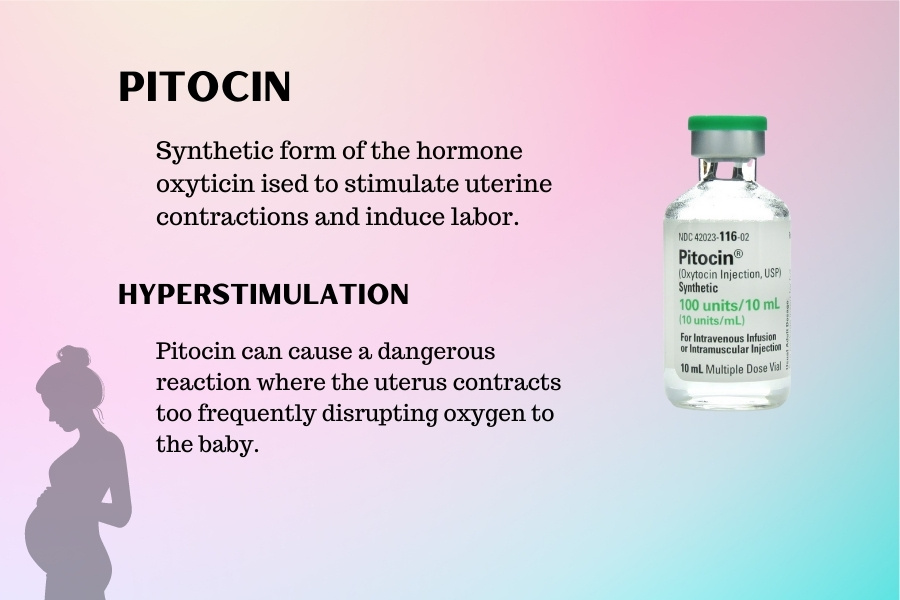The truth about Pitocin is that while it can save lives, it also comes with a whole host of potential side-effects that are often not fully understood or appreciated by those who use administer it. These side-effects can range from the mild (such as headache and nausea) to the potentially life-threatening (such as stroke and uterine rupture). That’s why it’s important to always weigh the risks and benefits of using Pitocin before making a decision to use it.
1. What is Pitocin and what does it do in the body
Pitocin is a synthetic form of the hormone oxytocin, which is naturally produced by the body. Oxytocin is responsible for stimulating contractions during labor, and Pitocin is used to induce or speed up labor in pregnant women. While Pitocin is similar to oxytoxin, they are not the same.
Pitocin is typically given through an IV drip, and the dosage will be increased until contractions are regular and strong. Once labor is underway, the dose will be tapered off or stopped altogether. Alternatively, it may be given via intramuscular injection.
2. Pitocin’s life-saving capabilities
Pitocin was developed in the 1920s and has been used routinely since then to induce or speed up labor. It is estimated that Pitocin is used in about one out of every four births in the United States. It’s benefits cannot be understated – without Pitocin, many women would die during childbirth.
Pitocin has been shown to be particularly effective in reducing the risk of maternal hemorrhage, which is one of the leading causes of maternal mortality. In one study, the use of Pitocin was associated with a nearly 50% reduction in the risk of postpartum hemorrhage.
Pitocin is also used to control bleeding after childbirth, known as the third stage of labor. This is because Pitocin can help the uterus contract and expel any remaining blood and tissue. without Pitocin, this process would likely take much longer, and there would be a greater risk of maternal hemorrhage.

3. What are some of the potential side-effects of Pitocin use?
Pitocin is generally considered safe, but there are some risks associated with its use. The most serious complication is uterine rupture, which occurs in about 1 out of every 1,000 births. This can be a life-threatening condition for both the mother and the baby and may require an emergency C-section.
One of the most common side-effects of Pitocin is a decrease in uterine blood flow, which can lead to uterine rupture, placental abruption (separation of the placenta from the uterine wall), or other serious complications. Additionally, because oxytocin is responsible for stimulating milk production, mothers who use Pitocin may experience an overabundance of milk, engorgement, mastitis (breast infection), or other breast related issues.
The less talked about side effects include postpartum depression and anxiety. It is not fully understood how or why, but some mothers who use Pitocin during labor report higher rates of these conditions after giving birth. In fact, these cases seem to be increasing. It’s likely that the injection of synthetic oxytocin, which is a powerful hormone, has an effect on the mother’s emotional state after birth. Oxytocin interacts with the brain’s “reward center,” and it’s possible that the sudden influx of oxytocin after birth creates an imbalance that contributes to postpartum depression and anxiety.
Other potential complications include:
* Fetal distress
* Severe headache
* Nausea and vomiting
* Water retention
* Diarrhea
* Low blood pressure
* Rapid heart rate
* Allergic reaction
4. What you can do to minimize the risk of experiencing side-effects from Pitocin
There are a few things that you can do to minimize the risk of experiencing side-effects from Pitocin. First, be sure to follow all of your healthcare provider’s instructions regarding the use of this medication. Second, stay well hydrated by drinking plenty of fluids before and during your labor. This will help to prevent water retention and other issues. Finally, try to relax as much as possible during your labor. Stress can exacerbate many of the potential side-effects of Pitocin, so it is important to remain calm and relaxed throughout the process. If you’re concern or struggling with the ability to relax, we offer pregnancy neurofeedback that can help you to relax and feel more connected to your baby.

5. Are there any natural alternatives to Pitocin?
Pitocin is the synthetic form of the hormone oxytocin, which is produced naturally by the body. Oxytocin is responsible for stimulating contractions during labor, and Pitocin is used to induce or speed up labor in pregnant women.
There are some natural alternatives to Pitocin that can help to stimulate contractions, but it is important to speak with a healthcare provider before trying any of these methods. Some of the more popular natural alternatives include:
* Red raspberry leaf tea – This herbal tea is rich in nutrients and has been shown to help tone the uterine muscles, which can lead to more efficient contractions.
* Acupuncture – This traditional Chinese technique involves the placement of thin needles in specific points on the body. It is thought that acupuncture can help to stimulate contractions by releasing endorphins and other hormones.
* Castor oil – This natural remedy has been used for centuries to induce labor. It is thought that the fatty acids in castor oil can help to stimulate contractions by mimicking the prostaglandins that are used medically to induce labor.
6. What to do if I’m struggling with postpartum depression and/or anxiety after receiving Pitocin?
At Pelios Academy, we are experts at helping mothers who have postpartum depression and anxiety. We help mothers overcome mental and emotional issues with a process called vocal mapping or EFT (Tapping) in conjunction with a custom infoceutical with a homeochord of oxytocin at 16X 30X 200X potencies. This helps the mothers to relax and feel more connected to their baby. Our program aids in balancing hormones and is 100% natural, drug free, and effective.
If you or someone you know is struggling with postpartum depression or anxiety, please reach out to us. We can help!


